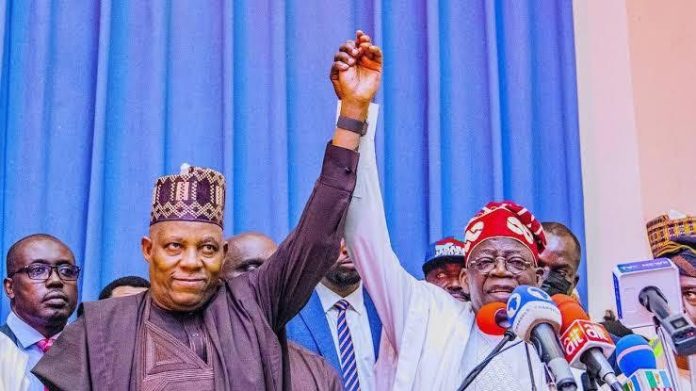The growing political controversy surrounding the Tinubu/Shettima presidential ticket for the 2027 general elections came to the fore at the Northeast Zonal Meeting of the All Progressives Congress (APC), held in Gombe on Saturday, June 14, 2025. Party leaders, stakeholders, and delegates gathered to endorse Tinubu for second amidst rising internal debates over the viability, unity, and future direction of the party ahead of the next electoral cycle.
If President Tinubu decides to drop Vice President Kashim Shettima in favor of another Muslim from the North, it could reignite the deeply divisive Muslim-Muslim ticket debate that stirred significant controversy during the 2023 presidential election.
Retaining Vice President Kashim Shettima may help the Tinubu camp avoid reigniting the contentious Muslim-Muslim ticket debate, but it also raises questions about the ticket’s continued strategic value. While the pairing was originally calculated to consolidate support among Muslim voters in the North during the 2023 election, changing political dynamics suggest that the ticket may no longer hold the same appeal. With growing dissatisfaction in parts of the North and shifting voter sentiments nationwide, some within the APC believe that the Tinubu/Shettima combination may now offer diminishing electoral returns.
Even if President Tinubu opts for a new Muslim running mate, the Muslim-Muslim ticket may no longer deliver the same political dividends in the North. A growing number of Northern-Muslim voters reportedly feel underrepresented or sidelined in the current administration, despite the religious alignment of the top two offices. Discontent over perceived sidelining in federal appointments, economic policies, and security outcomes has weakened the assumption that religious pairing alone can secure Northern loyalty. As such, simply replacing Shettima with another Northern Muslim may not be enough to re-energize the base or guarantee widespread support in 2027.
Should President Tinubu replace Shettima with another Muslim from the North, it would likely provoke renewed backlash from Christian communities nationwide, especially in the North. Many would raise the familiar and legitimate question: Are there no capable Northern Christians fit to serve as Vice President? In a country where religious identity plays a central role in politics and representation.
If President Tinubu chooses a Northern Christian as his running mate, he risks alienating a core part of the APC’s support base; the Northern Muslim voters, who have historically been the backbone of the party’s electoral strength in the north. Many within this bloc view the Muslim-Muslim ticket as both symbolic and strategic. Without votes from the north, Tinubu second term will have key-leg
Selecting a running mate from the Northwest could trigger resistance or even quiet rebellion from the Northeast, which may interpret the move as a political slight or marginalization. Having produced the current Vice President, the Northeast might expect to retain the position as a matter of continuity and recognition of its contribution to the party’s 2023 victory. Overlooking the region could stir resentment among its political leaders and grassroots supporters, potentially weakening the APC’s hold in key Northeastern states. It may also open the door for opposition parties to exploit regional grievances and rally disaffected voters under the banner of regional justice and equity. The NorthCentral will also ask some questions- Tinubu won four states in north central- Kogi, Benue, Kwara and Niger
Choosing another Muslim running mate from the Northeast, but outside the Borno-Yobe axis, could provoke backlash from that axis. The Borno-Yobe axis, long considered the APC’s stronghold in the Northeast, may view such a move as a betrayal of loyalty, especially given that Borno was the only state in the region that delivered a win for Tinubu in the 2023 presidential election. Overlooking this acus in favor of another Northeastern state could result in protest votes or political apathy from key stakeholders and voters who feel their support is being taken for granted. In a tightly contested 2027 race, such fractures could prove costly.
Ultimately, the debate surrounding the Tinubu/Shettima ticket for 2027 is shaping up to be an early and avoidable self-inflicted wound for the APC. Rather than uniting the party around governance and strategy, it has reopened an unnecessary debate and controversy . This is fueling unnecessary tension within the party ranks and distracting from core governance issues that could strengthen the APC’s re-election prospects. Yet, amid all the speculation and lobbying, it is important to remember that the selection of a running mate remains the sole constitutional prerogative of the presidential candidate. While input from party leaders and stakeholders matters, the final decision rests with President Tinubu, who must now weigh loyalty, optics, regional dynamics, and electoral viability in making a choice that could define both his legacy and the APC’s future.
Zayyad I. Muhammad writes from Abuja, zaymohd@yahoo.com, 08036070980


